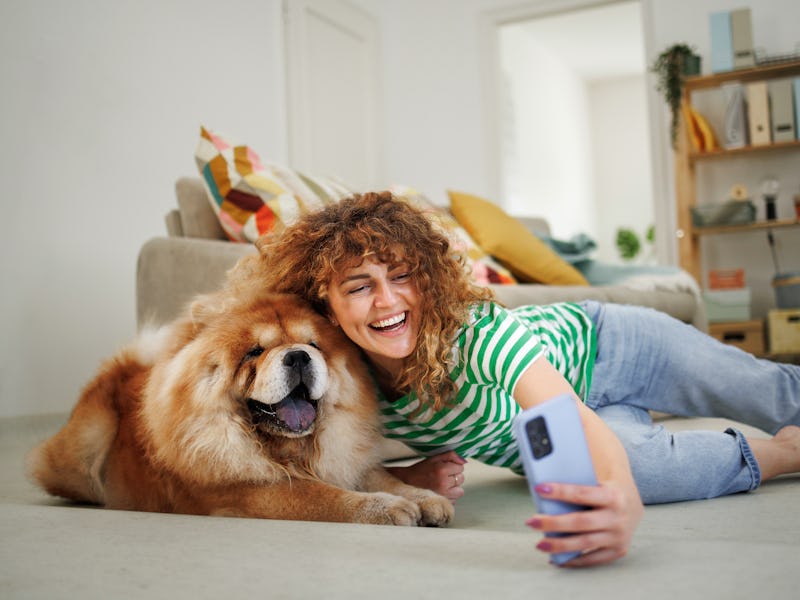Can Pets Make Us Less Lonely? This Unlikely Creature Might Be Best For Our Mental Health
Research shows that animals are good for our health, but one animal might beat out the rest.

Pets give us so much. The pandemic year of 2020 showed us just how much our furry (and hairless, spiny, scaly, etc.) friends buoy us through. Perhaps the most obvious evidence is through the sheer number of pet adoptions seen during the height of the pandemic.
Those isolating days were also a stark reminder of something else: the loneliness epidemic that’s currently taking a toll on Americans. In fact, the U.S. Surgeon General recently released a report, sounding the alarm about the epidemic and steps that could be taken to mitigate it. That begs the question: When it comes to addressing our deep need for connection, what role do our non-human pals have?
How do pets improve your well-being?
Plentiful research shows that animals are good for both our short- and long-term health. “We know that interactions with animals are associated with reduced stress (decreased cortisol), lowered blood pressure, and increased hormones that are associated with feeling good (oxytocin),” Kat Pankratz, a board-certified veterinary behaviorist at the Animal Behavior Clinic in Portland, Oregon writes to Inverse. Lower stress and blood pressure are associated with increased health span.
Other experts on human-animal relationships second these physiological effects. Nancy Gee, director and psychiatry professor at the Virginia Commonwealth University School of Medicine’s Center for Human-Animal Interaction, corroborates that a cuddly animal is associated with oxytocin release.
Dogs also get their owners up and walking (or running) multiple times a day, creating a more meaningful exercise routine. But any pet owner knows that the relationship with an animal is special in and of itself. Gee elaborates on how dogs are emotionally attuned to their people.
Attachments are crucial to experiences of human connection. Gee says that people need attachments or bonds “with other living beings.” She mentions four attachment criteria: “When we attach to another person, we find them enjoyable; we find them comforting; they're missed when they're absent; and we seek them out when we're in distress.”
She adds that those four feelings don’t need to involve a human necessarily. “Those four things can also readily be applied to dogs.”
Gee continues that these benefits aren’t limited to pet dogs. When students or patients interact with animals brought for temporary bonding, called pet interaction. There had been a question of whether people actually had their spirits lifted from interacting with the pet or if some of that effect came from seeing the pet’s human handler. As part of Gee’s research, she’s conducting randomized trials in which some patients are visited by the handler and the pet, and some patients only by the handler.
“What our preliminary results are showing is that the people who get assigned to the dog condition experience a reduction in loneliness, a reduction in anxiety, and an improvement in mood — but that's not true of the handler-only condition,” she says.
Is one animal best for loneliness?
At first blush, a dog might seem like the ideal pet to assuage loneliness. Dogs famously need and love big doses of attention, but they also create opportunities to meet other people.
“If you take your dog for a walk in the neighborhood and you meet a complete stranger, you have something to talk about,” Gee tells Inverse. The dog becomes what Gee calls a “social lubricant” who lowers the barrier to conversation. “It allows us to have these opportunities to communicate with other human beings, which also decreases our loneliness.”
So when it comes to relieving feelings of isolation, does any animal compare to dogs?
“Well, maybe horses do,” Gee says. “Horse owners are incredibly attached to their horses in many cases.” If you’ve seen Barbie, then you know that a certain man develops an affinity for the equine species. Like dogs, horses have a complex history of domestication, employment, and emotional attachment to humans. Pankratz cites a 2022 study that found pet dogs and horses impacted mental well-being more strongly than other animals, too.
But Gee says that there’s evidence humans also grow attached to their cats, birds, and fish. This connection arises from how much we interact with animals. Gee says that a person who takes their dog for multiple walks and training sessions every day, followed by snuggly naps, will have a very different attachment than a person who keeps their dog outside in the yard. Of the latter, she says, “I'm gonna guess those people are not highly attached to those dogs.”
Does my pet get lonely?
On the other side of the equation, pets need socialization too. Dogs, in particular, have high social needs.
“These animals became very adept at socializing with humans,” Gee says. “They're sensitive to our emotional states and our social gestures. They're able to communicate using complex cues. They're able to form complex attachment relations with humans. So absolutely, they are lonely when we aren't there with them.”
So, know that your pet needs you as much as you need them — not just for food and shelter, but for their own social health.